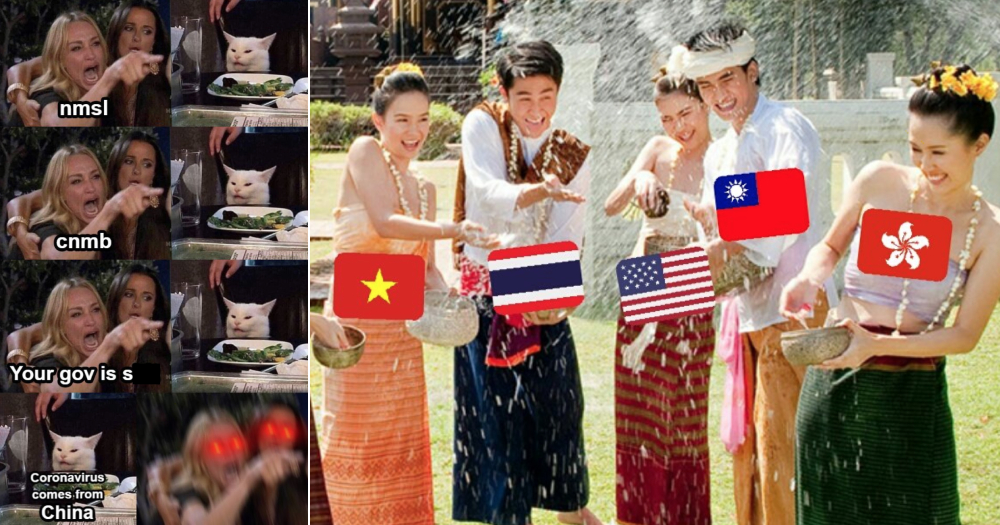A spat on Twitter between Thai and Chinese social media users over the weekend has once again highlighted China's weakness: A public relations nightmare brews whenever its people interacts in a hostile manner with citizens of other nations.
"Milk Tea Alliance"
The episode -- sparked by a retweet by the girlfriend of a popular Boys Love drama's lead actor -- spawned an informal "alliance" among the young Thais, the Taiwanese and the Hong Kong pro-democracy activists.
4/ When China has been stepping up its influence in Asia, the threat is now on our doorstep. Therefore, I hope all Asian societies can build pan-Asian solidarity to fend off all forms of authoritarianism from China, with our creativity and fondness for liberty. pic.twitter.com/UBXewh4RD4
— Joshua Wong 黃之鋒 😷 (@joshuawongcf) April 15, 2020
The newfound solidarity against what appears to be a common enemy was even dubbed "milk tea alliance" -- the drink was chosen as a unifying symbol as all three places have their own versions of milk tea, while China has none.
https://twitter.com/nnevvy_19/status/1250218862307504128
Chinese embassy stepped in
The exchange got so heated that the Chinese embassy in Thailand stepped in and released a statement to reject the "erroneous" claims made by the Thai Twitter users, which "reflect bias and ignorance of its maker".
The Chinese embassy proceeded to highlight the good relations between the governments of both countries, saying China and Thailand are a family.
However, this expression of goodwill failed to win over Thai internet users, who are mainly liberal, relatively young, and more progressive, as compared to the older population.
Anti-Chinese sentiment part of Thais' fight against government
The disconnect between young Thais and the government, as well as the monarchy, has grown increasingly wider.
This episode further illustrated that the younger Thais do not necessarily buy into official narratives repeated by the government.
Growing distrust of the authorities is seen with their support for the now-dissolved Future Forward Party, and willingness to criticise the ruling elite on social media, despite the tough lèse majesté law that makes it illegal to criticise the monarchy, and increased crackdown on dissent by Prime Minister Prayuth Chan-ocha.
Anti-Beijing sentiment has become part of their fight against the authorities, Wasana Wongsurawat, an China expert at the Chulalongkorn University told Reuters.
Young Thais remain unfazed in the face of insults
The episode has also brought attention to China's problem when it comes to their public relations strategy using foreign social media platforms such as Twitter.
Hong Kong-based author and pro-democracy activist Jason Y. Ng pointed out what appears to be the difference in characteristics between Thai netizens and the Chinese 50 Cent Army, who are social media warriors employed by the Chinese government to defend the party's stance.
He said the Thais won the PR war on Twitter as they do not equate their country to the government, which frees them up to love their country, while still being able to reserve their own opinion towards the government without having to follow them with "blind loyalty".
https://twitter.com/jasonyng/status/1249704100821757952
The Thai response, seen as sarcastic as opposed to the other side, which has been perceived to be rather tone deaf, garnered praise from foreigners with the same political views as well.
Some even took this brand of humour and made it their own.
CCP: nmsl
— Emily Tam (@EmilyTam13) April 13, 2020
HKers: yeah, we all want to
#nnevvy pic.twitter.com/4ehnwqKW9w
Young Thais won the PR fight with their self-deprecating humour
Insults that Chinese netizens use on the Thais did not appear to have the desired effect, with the Thais brushing off the criticisms and even coming up with witty ripostes.
For instance, when the Chinese netizens insult the Thai government and monarchy, the Thai netizens, who are already critics of their own government, readily agreed with the Chinese.
 Screengrab via Twitter
Screengrab via Twitter
Thank you thailand warriors, love thais #nnevvy pic.twitter.com/xfBnVE9YHM
— Yan (@lyt_55) April 12, 2020
The Thais even took a common insult used by the Chinese internet trolls, and turned it into a nickname for the latter.
Well done Thai!
— 嗒嗒「祈翠動物園加速獅」🌻🇺🇦🌻 (@DaDa8964) April 14, 2020
NMSLESE has been included into the Urban Dictionary.#nnevvy pic.twitter.com/1r3ctEocEy
Perhaps such a response is unthinkable to many Chinese, or at least to the social media keyboard warriors.
Love for country = love for the party?
Beijing has equated love for the country to love for the party in its new set of "patriotic education" guidelines, making the two entities inextricably tied together.
This means Chinese citizens are expected to buy into the party's stance and ideology when it comes to the country's foreign policy.
This has inevitably resulted in overzealous displays of ultranationalism at times whenever China's sovereignty appears to be threatened, such as during the outbreak of the Hong Kong protests in 2019 -- even though few Hong Kong activists openly advocated for independence.
In addition, Thais remain unfazed even when Chinese netizens brought up the Thai massacre of Oct. 6, 1976.
In response, the Thais brought up the Tiananmen Square incident.
While Chinese nationalists might have thought it would be an embarrassment or a disgrace to one's country should its touchy history be revisited, this was not the case for the young Thais, who replied that they would like to raise awareness of the tragic event too.
Aggressive overseas signalling fulfils domestic purpose
The tactic used by these Chinese nationalists on Twitter is not unlike the one employed by Chinese diplomats on the same social media platform, which comes across as being particularly aggressive.
While such a tactic might have turned most of its international audience away, it has been said to serve a domestic purpose, such as stoking national pride among the Chinese to distract them from other more pressing issues, which is a strategy not exactly exclusive to the Chinese government.
Viewed in this lens, the Chinese government has managed its public relations well domestically.
Nationalism a double-edged sword
Nationalism, however, is a double-edged sword.
If not kept under control, it can go out of hand, and even challenge the party, especially if the party is seen as not being assertive enough in its foreign policy when it comes to protecting China’s interests.
Top image adapted via Twitter
If you like what you read, follow us on Facebook, Instagram, Twitter and Telegram to get the latest updates.
